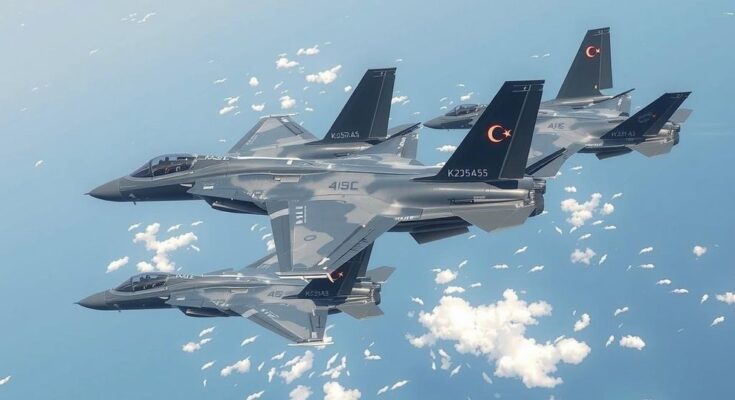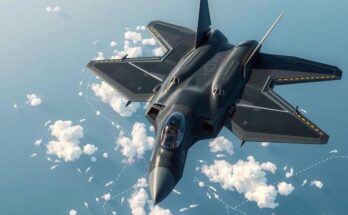Saudi Arabia has commenced negotiations to purchase up to 100 Turkish Kaan fifth-generation fighter jets amidst ongoing restrictions on acquiring F-35s. This move reflects Saudi Arabia’s broader strategy to diversify its defense procurement, seek technology transfers, and collaborate with Turkey to modernize its air force capabilities, further solidifying Turkey’s role as a key player in the international defense market.
Saudi Arabia has initiated negotiations with Turkey for the procurement of up to 100 Kaan fifth-generation fighter jets, as reported by Ekotrent on December 26, 2024. The discussions occurred during a three-day meeting in Istanbul between Turkish Defense Industry President Haluk Görgün and Saudi officials, including Deputy Defense Minister Khaled bin Hussein Al-Biyari. The talks focused on aircraft acquisition, joint production opportunities, and technology transfer agreements, with expectations for deliveries in the 2030s.
This potential procurement further emphasizes Saudi Arabia’s efforts to diversify its defense sources, especially in light of its inability to procure the U.S.-made F-35 despite requests dating back to 2012. Saudi Arabia’s interest in the Kaan jets is also mirrored by Ukraine, which has expressed intentions to acquire the aircraft, thereby strengthening Turkish-Ukrainian defense collaborations.
The growing defense relationship between Saudi Arabia and Turkey has seen significant developments, including a $3.1 billion deal in 2023 for 60 Baykar AKINCI unmanned combat aerial vehicles. This collaboration aligns with Saudi Arabia’s Vision 2030 strategy, which aims to foster a self-sufficient defense industry through technology transfer agreements and local production capabilities. The Kaan jets, designed by Turkish Aerospace Industries, stand as a critical element of this strategy by providing Saudi Arabia with modern combat capabilities while decreasing reliance on U.S. systems.
The Kaan jet itself is a cutting-edge twin-engine stealth fighter with advanced features such as supercruise capability, and it is engineered with indigenous munitions in mind. This modern aircraft is developed to operate alongside existing fleet components, including F-15s and Tornadoes, enhancing the overall military efficiency of the Saudi Air Force. Meanwhile, Turkey continues to develop its own advanced air warfare capabilities, integrating a suite of innovative UAV systems and advanced fighter jets into its arsenal.
It is indeed noteworthy that the Kaan represents a shift towards self-reliance in defense procurement in the Middle East, showcasing Turkey’s technological advancements while providing Saudi Arabia with strategic avenues to modernize its military. The agreement, once finalized, is poised to not only bolster Saudi Arabian air power but also fortify Turkey’s position as an emerging force in the global defense market, particularly in drone technology and allied aerial acquisitions.
The Kaan project, initiated in 2016 by Turkish Aerospace Industries (TAI) and aimed at modernizing Turkey’s air fleet, serves as a response to historical reliance on foreign military equipment. U.S. restrictions, particularly relating to regional stability and human rights, have influenced Saudi Arabia’s inability to acquire cutting-edge aircraft such as the F-35, prompting a search for alternatives. This diversification strategy is evident not only in Saudi Arabia’s interest in Kaan jets but also in its agreements for unmanned aerial vehicles with Turkey. As both nations advance their defense capabilities, their bilateral relations have strengthened significantly, leading to the initiation of joint projects and collaborations.
Negotiations between Saudi Arabia and Turkey regarding the acquisition of Kaan fighter jets signify a pivotal development in the Middle East’s defense landscape. This potential deal is indicative of Saudi Arabia’s strategic shift towards diversification of defense procurement sources, particularly given the obstacles faced in acquiring U.S. fighter jets. Additionally, the partnership could enhance Turkey’s stature in the global defense sector while empowering Saudi Arabia’s air force modernization efforts in support of its broader Vision 2030 objectives.
Original Source: armyrecognition.com




